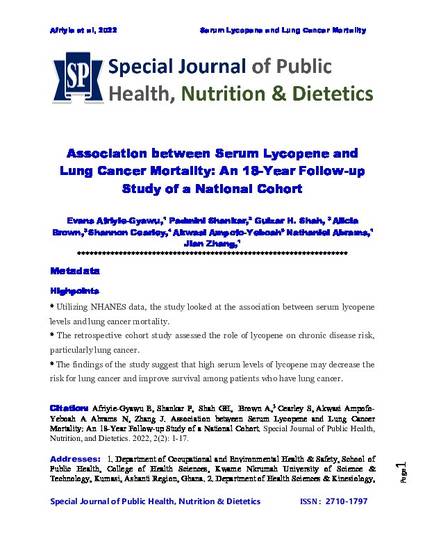
Background: Lycopene is a carotenoid found in some fruits and vegetables that is responsible for the red pigment in tomatoes and tomato products. While many studies have shown a link between lycopene and protection against the initiation and/or progression of lung cancer, data on its effect on lung cancer survivability is limited.
Objective: The primary objective of this study was to see if there was a link between lycopene levels in the blood and lung cancer mortality. A secondary goal was to see if dietary factors influence lycopene levels in the blood.
Materials and Methods: A retrospective cohort study of 14,358 adults who took part in Phase II of the National Health and Nutrition Examination Survey III was carried out (1991- 1994). This dataset served as the baseline for a 15-year (1991-2006) follow-up study, which was correlated with the National Death Index database. The Cox Proportional Hazards Regression Model was used to calculate the HR for all-cause and cancer-related deaths for individuals with high, moderate, and low serum lycopene levels.
Results: The unadjusted hazard ratio (HR) of deaths associated with low serum lycopene levels (25 percent cutoff) was 1.67 (95 percent CI=1.24-2.23) and 1.00, respectively (ref). After controlling for multiple risk factors such as age and gender, the HR for lung cancer fatalities was 1.45 (95% CI=1.08-1.96) for low serum levels (25 percent cutoff) with a reference value of 1.00. For low vs. high serum lycopene levels, the adjusted HR for lung cancer death using 3-level categorization (and adjusted for fruits and vegetables) was 1.67 (95 percent CI=1.03-2.71). In addition, the adjusted HR for lung cancer death using 3-level categorization (and unadjusted for fruits and vegetables) was 1.68 (95 percent CI=1.04-2.72) for low serum lycopene levels vs. high serum lycopene levels.
Conclusions: The results suggest that high serum lycopene levels may reduce the risk of dying from lung cancer. Furthermore, lycopene may not only reduce the risk of lung cancer development but may also improve survival among lung cancer patients. More research is needed to understand the physiological mechanisms underlying this association.
Available at: http://works.bepress.com/gulzar_shah/407/

This open-access article is distributed by the terms and conditions of the Creative Commons Attribution 4.0 International License seen in this link (http://creativecommons.org/licenses/by/4.0/ ). You are free to use, distribute, and reproduce this article in any medium, provided you give correct credit to the original author(s) and the source, including the provision of a link to the Creative Commons license website. Pls show any modification’s